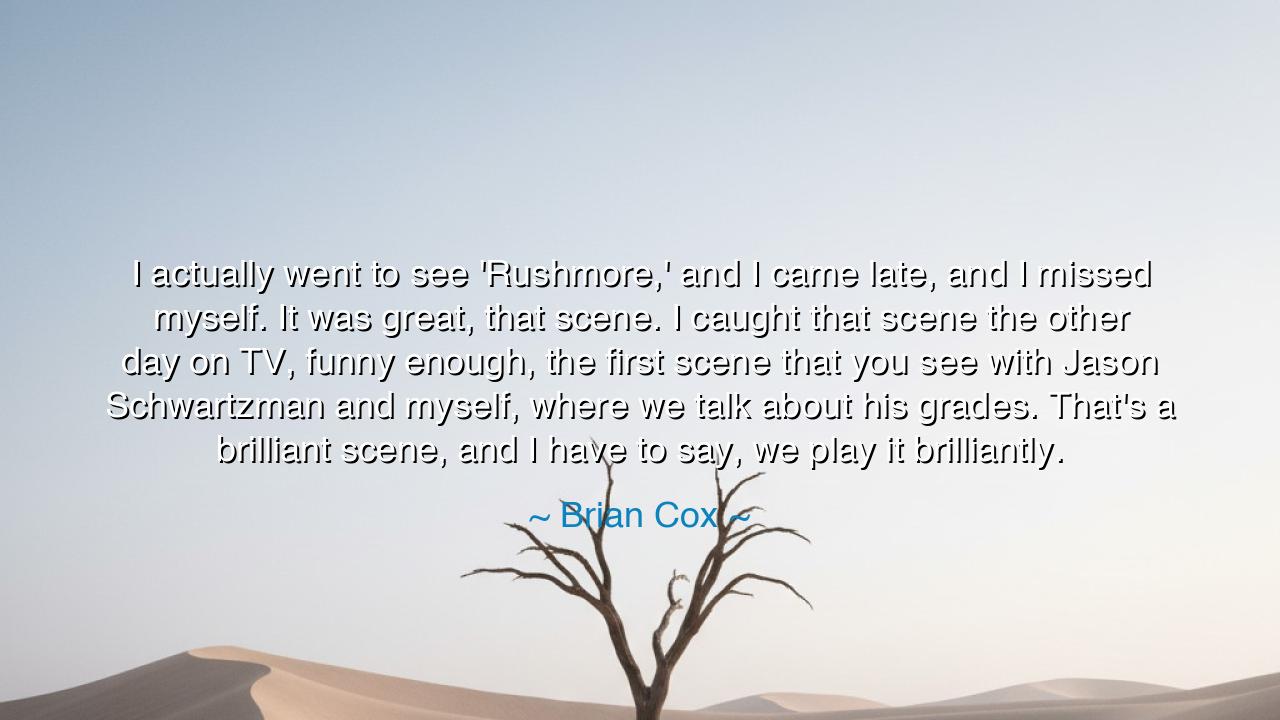
I actually went to see 'Rushmore,' and I came late, and I missed
I actually went to see 'Rushmore,' and I came late, and I missed myself. It was great, that scene. I caught that scene the other day on TV, funny enough, the first scene that you see with Jason Schwartzman and myself, where we talk about his grades. That's a brilliant scene, and I have to say, we play it brilliantly.






In the words of Brian Cox, “I actually went to see ‘Rushmore,’ and I came late, and I missed myself. It was great, that scene. I caught that scene the other day on TV, funny enough, the first scene that you see with Jason Schwartzman and myself, where we talk about his grades. That’s a brilliant scene, and I have to say, we play it brilliantly.” There is laughter in his tone, but also quiet revelation. Beneath the jest lies a timeless truth—the truth of self-reflection, of seeing oneself not through vanity but through the lens of art, humility, and time. For to miss oneself and later find that self again—transformed, distant, and strange—is the experience of every soul who creates, who lives, and who learns to look back with wonder rather than regret.
Cox’s words speak not merely of an actor who missed his scene, but of a man who glimpsed the mirror of memory. When he finally saw his younger self on the screen, he did not dwell on perfection or fame; instead, he admired the craft—the shared rhythm between two performers, the moment of creation made eternal. This is the essence of art, and indeed of life: we live each moment unaware of its full brilliance, only to look back later and realize that we had touched something divine without knowing it. Such is the way of all human endeavor—we miss ourselves in the moment, only to rediscover ourselves through time.
In the temples of old, the Greeks spoke of anamnesis, the act of remembering the truths our souls once knew. In the same spirit, Cox’s reflection reveals that art allows remembrance—not just of character or performance, but of one’s own growth. Like a sculptor beholding the marble he once carved, he sees not only the stone but the hand that shaped it. Yet he does not worship his own creation; he marvels at it as something beyond himself, a gift he was once allowed to channel. This humility, disguised as humor, is the mark of true wisdom.
Consider the story of Socrates and Alcibiades, when the young noble, intoxicated by pride, sought to outshine his teacher. Socrates told him: “You look upon your reflection in the mirror of the world, but you do not yet see yourself.” Years later, when Alcibiades returned broken by war and failure, he found in his memories the teacher’s truth—he had once missed himself, chasing glory, and only now did he find the man he was meant to be. Brian Cox’s tale, though simple, carries the same echo. To “miss oneself” is not a loss—it is a necessary passage in the journey of self-recognition.
When Cox says, “We play it brilliantly,” there is no arrogance. There is celebration—of collaboration, of the moment well-lived. In the craft of acting, as in life, the greatest beauty lies not in solitary triumph but in shared excellence. He honors not himself alone, but the scene, the connection, the fleeting alignment of two spirits performing truth. It is as if he says to us: “Look—when the world aligns, when we forget the self and become part of something greater, that is brilliance.” This lesson reaches beyond the theater—it belongs to every artist, every worker, every thinker who strives to be present in their craft.
And yet, there is another meaning hidden within. When Cox came late to his own scene, it mirrors how we all live—forever arriving late to our own lives, blind to the beauty of our moments until they have passed. Only later, when time replays them for us—through memory, reflection, or even accident—do we recognize how well we played our part. The tragedy and glory of human existence are this: we cannot see the full brilliance of our scene while we are in it. Awareness comes after, and gratitude only blooms when the curtain has already fallen.
Therefore, let the lesson be this: do not rush through your own performance. Be present. Live your scene fully, for you may not see its light again until much later, and by then, it will be only a memory playing on the television of your soul. Appreciate the art of your own existence, as Cox did when he laughed and said, “We play it brilliantly.” Let humility accompany pride, and let time be your gentle teacher.
Practical teaching: Each day, take a moment to look back—not with sorrow, but with wonder. Ask yourself, “Where did I play my part well today?” Whether in a small act of kindness, a shared laugh, or a task done with quiet skill, recognize your own brilliance. And when you falter, forgive yourself as an actor forgives a missed line, for the play continues. In doing so, you will learn to see your life as Cox saw his scene—not with vanity, but with joyful reverence, knowing that the art of living is, indeed, played brilliantly.






AAdministratorAdministrator
Welcome, honored guests. Please leave a comment, we will respond soon